Our Research Solid-state scrap processing: A pathway to drastically reduce water consumption in steelmaking
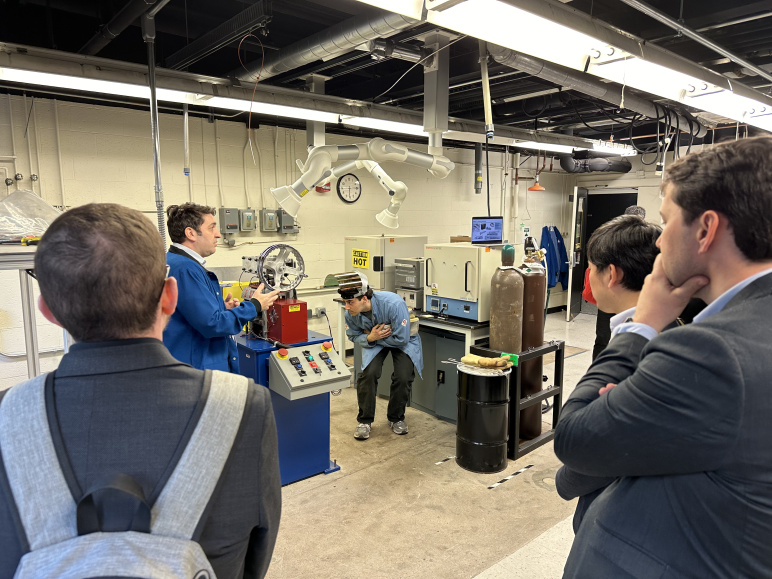
The research team before an experiment during a J-WAFS visit. Onur Guvenc, PhD (left), is presenting the test set up to the visitors while Abhi Sharda (right) is adjusting rollers.
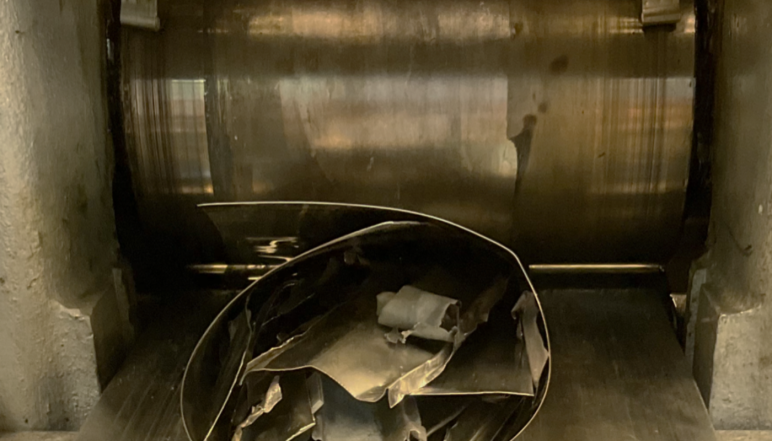
Enclosed scrap metal at the inlet of a roller.
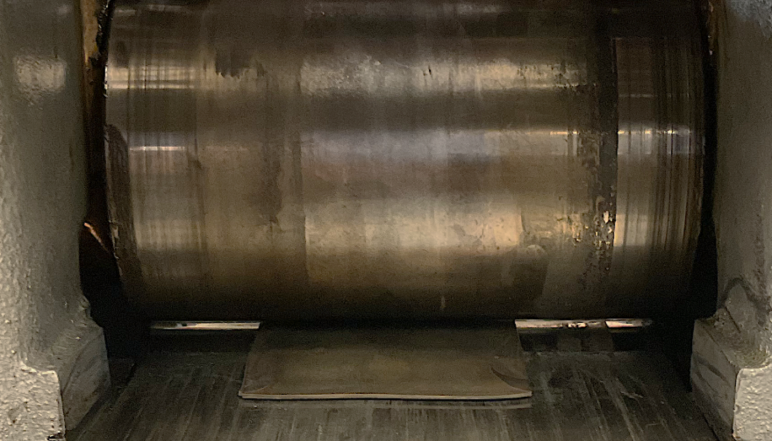
Roll-bonded sheet metal exiting the rolls.
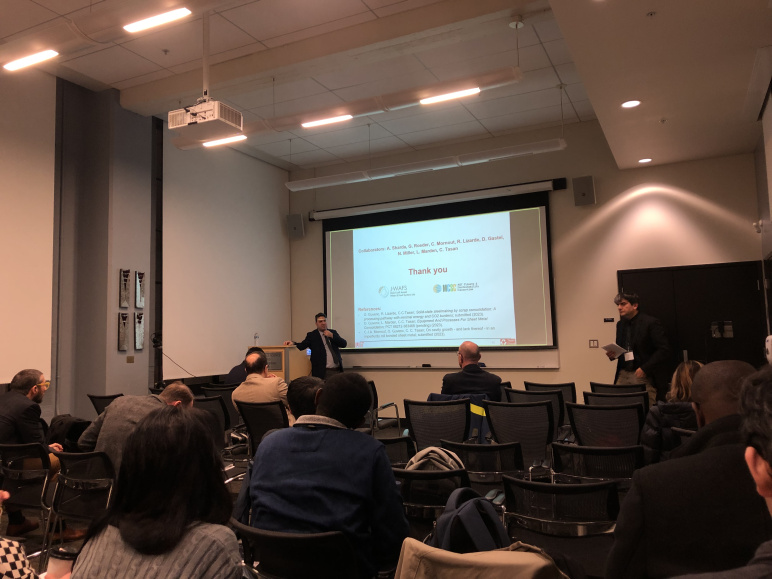
Onur Guvenc, PhD, presenting “Scrap Metal Consolidation” at the MIT Alloy Design Workshop 2023 while Cem Tasan stands on the right.
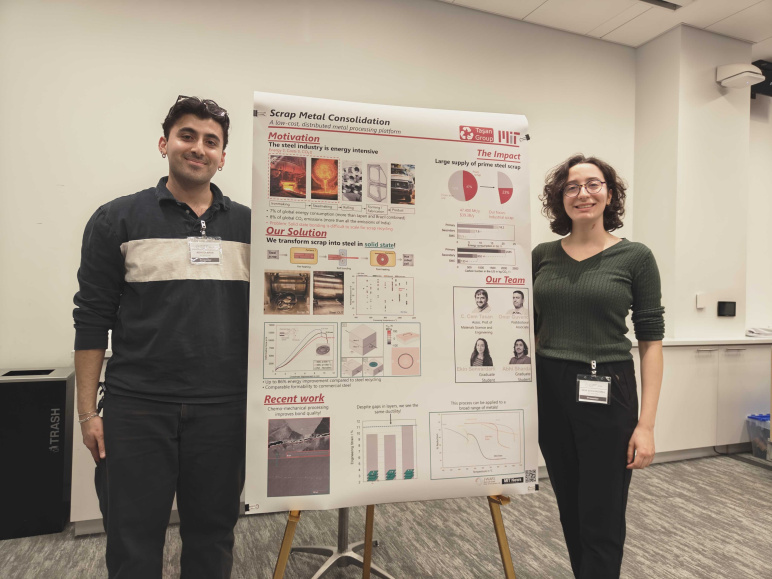
Graduate students Abhi Sharda and Ekin Senvardarli from Tasan's lab present their poster “Scrap Metal Consolidation” at MIT Climate and Energy Night 2024.
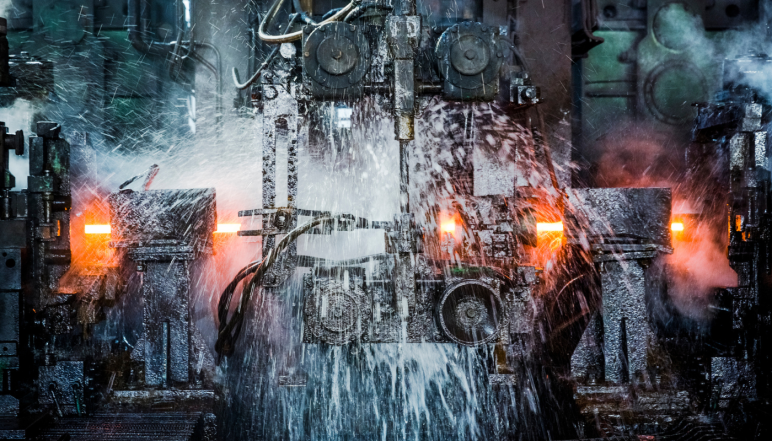
Potential impact of scrap metal consolidation per tonne of steel produced. Photo credit: © chinaface – iStock
Principal Investigator
Cem Tasan
- POSCO Associate Professor of Metallurgy
- Department of Materials Science and Engineering
Professor Cem Tasan is the Thomas B. King Associate Professor of Metallurgy in the Department of Materials Science and Engineering (DMSE) at MIT. He received his PhD in mechanics of materials from the Eindhoven University of Technology in the Netherlands. Then he moved to Max-Planck-Institut für Eisenforschung in Germany, where he worked first as a post-doctoral researcher, then as a group leader. He joined DMSE at MIT in January 2016 and received tenure there in May 2022. Professor Tasan explores the boundaries of physical metallurgy, solid mechanics, and in-situ microscopy in order to design new alloys with exceptional damage-resistance.
Photo credit: Adam Glanzman
Challenge:
Can we manufacture formable sheet metal by consolidating steel scrap without melting, thereby using less freshwater than traditional steel processing? Can we make this process continuous and scale it up to displace iron-ore based steel processing?
Research Strategy
- Assess the technical feasibility of consolidating high-end metal scrap (e.g., stainless steel, copper) as a beachhead market
- Engineer a product prototype, manufacturable by lab-scale consolidation
- Complete the system design of the automated processing unit based on thermo- economical analysis
- Use customer discovery to finalize the initial product offering
Project description
Scrap Metal Consolidation (SMC) is a metal-forming process for transforming scrap metal pieces into formable sheet metal in a solid state. SMC is an alternative to conventional metal recycling processes, which require large amounts of fresh water and energy and contribute to 8% of total CO2 emissions globally. If implemented at scale, SMC can decrease the energy need for steel recycling by up to 86%, as well as reduce the linked CO2 emissions and water consumption. In the United States, 46% of annual steel production is linked to steel recycling, and the research team estimates that it is possible to replace half of the U.S. steel recycling operations with SMC.
Through lab-scale proof-of-principle investigations, the researchers have already identified SMC metallurgical process conditions and validated the mechanical formability of resulting steel sheets, focusing on the case of mild steel, the most common sheet metal scrap. The J-WAFS project will:
- Build customer product prototypes
- Design the processing unit
- Develop a scale-up strategy and business model
Learn more about Cem Tasan:
Outcomes
- Identified the bonding performance and mechanical response of stainless steel, aluminum, copper, nickel, titanium, and galvanized steel
- Led lab-scale and formability trials with stainless steel and manufactured a prototype product
- Conducted customer discovery through over 20 interviews with professionals in the scrap management ecosystem
- Completed a draft techno-economic model and finalized an initial product offering
Publications
Solid-state steelmaking by scrap consolidation: A processing pathway with minimal energy and CO2 burdens
Onur Güvenç, Rebecca Lizarde, and C. Cem Tasan, Journal of Cleaner Production, 2024
Cavity growth – or lack thereof – in imperfectly roll bonded sheet metal
Mornout, C. J. A., Güvenç, O., and Tasan, C. C., Journal of Materials Processing Technology, 2024
Additional Details
Impact Areas
- Water
- Climate & Sustainability
Research Themes
- Sustainability & Adaptation
Year Funded
- 2023
Grant Type
- Solutions Grant
Status
- Completed
